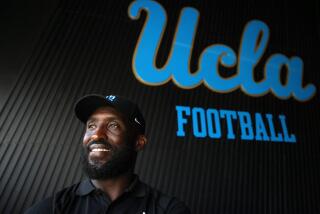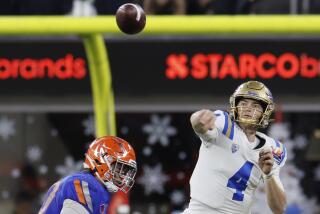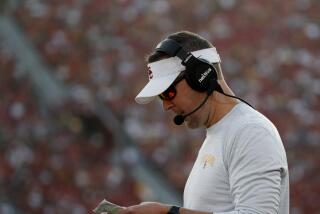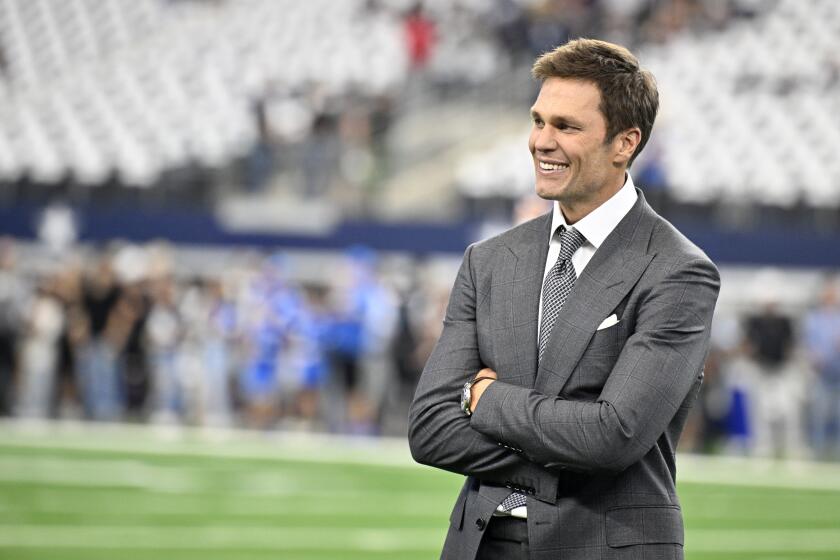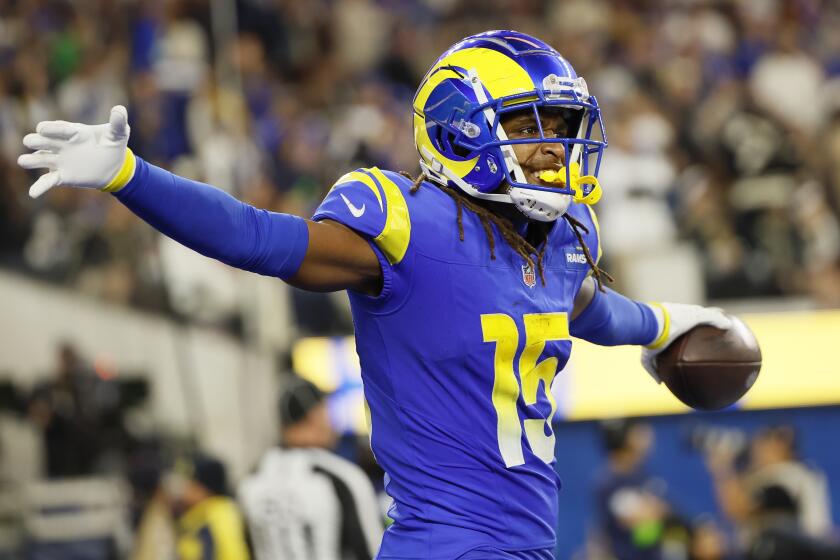This comeback had a rather humble beginning
Rick Neuheisel’s redemption, his road back to UCLA and respectability, began with a phone call and a plea.
It was the summer of 2003 and Neuheisel had recently been fired as football coach at the University of Washington for lying about his involvement in a high-stakes basketball betting pool. He’d gone from hero, a Rose Bowl winning coach, to villain. There was no firm ground to stand on, this was purgatory.
Angry, unsure, and feeling lost with no team to coach, he needed to steer his emotions in the right direction. Some suggested he put coaching in the rearview mirror. Some said that with his charm, he’d have a fine career in television. But that afternoon, all Neuheisel wanted was to coach again.
So he picked up a phone and called Mark Haley, the venerable coach at Rainier Beach High, a tough campus in the hardest corner of Seattle.
At first, Haley thought it was a prank. He’d hardly talked to Neuheisel before.
This was no prank. This was a petition from a man looking to find his way again. “Coach Haley, can I come down there and be a volunteer assistant?”
Neuheisel would end up getting the job and holding it for two seasons. From there he’d move to the NFL, becoming the offensive coordinator in Baltimore, and he’d achieve a measure of vindication for his firing, receiving a $4.7-million settlement of a wrongful termination suit against the NCAA and Washington.
Last month, finally, he returned at 46 to the campus where he became famous as a player. Despite all of those who said it would never happen, despite those who said that with his past it never should, Neuheisel landed his dream job: head coach at UCLA.
Funny, isn’t it, how fate works? Neuheisel’s story might well have turned out differently had he not made that call and had Mark Haley not responded as he did.
“If the principal and the teachers agree,” Haley recalls saying over the phone, “we would love to have you.”
Back then, word spread quickly that a new quarterback coach would soon be plying the sidelines at Rainier Beach, a campus of roughly 600 kids, almost all of them minorities, most of them poor.
The betting pool and his firing had tarnished Huskies football. In Seattle, that’s like taking a hammer to the Taj Mahal. So, parents wrung their hands. The Rainier Beach athletic director was threatened. Commentators heaped their scorn.
The “leap to Rainier Beach . . . smacks of a slick campaign to polish a bruised image,” one Seattle columnist wrote. “The timing speaks volumes. . . . [While new information about the ex-Husky coach’s answers to NCAA investigators comes out] Neuheisel high-steps to the South End for pigskin redemption in the hood.”
Even the players had doubts.
On a hot Wednesday in August, the first day of practice, they watched warily as he jogged out with the other coaches, dressed in his white T-shirt, blue shorts and blue Rainier Beach Vikings hat.
Neuheisel knew about the doubts. To calm them, he hunkered down and did what he does best. He joked and cajoled, asked questions and blended in. He told the players that he wanted to get to know each of them, and that soon he would memorize all of their names.
By the end of Wednesday he’d made a point to chat briefly with half of them.
By the end of Thursday, he’d talked to the rest.
On Friday, as the young players stretched, Neuheisel walked slowly to each one of them. He shook hands with each player. Without prompting or help, he said each player’s given name, and then, for good measure, he recited each player’s nickname: there was A-Train and Cisco, T-Will and Tubby, Junior and Biscuit . . . on and on, roughly 50 kids. Connection.
“That broke the ice,” remembered Lonzell Maddock, now a wide receiver at Iowa Wesleyan. Maddock, known in high school as Biscuit, was a junior quarterback at Rainier Beach. “Knowing our names like that, and so fast? Man, from that time on, it was like he was one of us.”
It would have been easy for Neuheisel to come for a while and then disappear. Understandable even. At Washington, he made as much as $1.5 million a year, his teams played on national television, his facilities were first class, his players had everything: talent, free room and board, confidence.
At Rainier Beach he made no money, his games weren’t even on radio and the coaches had to borrow a television to watch tapes in a cramped office that smelled like old socks.
Some of the players had talent and confidence, some did not. Some juggled practice with work because they had to help bring food home. Some were homeless.
For two years, Neuheisel was a constant at practice, and there at every game but one.
He sat with the players as they rode together in old yellow buses, driving off to play schools in Seattle and to towns far from there.
He shied from interviews and became a brother to Haley and the other coaches. Neuheisel made clear to them that he was only there to help, not to take over. Whatever was needed, he would do: He’d help with game plans, of course, but also with taping ankles and putting on shoulder pads and giving kids rides across town to their homes.
“We counted on him,” Maddock said. “What a great experience. For us, yeah, [and] you could tell it, for him.”
Neuheisel worked closely with Maddock and the other quarterbacks, whom he hosted for pregame pizzas at his home. He revamped their technique, taught them to read defenses, how to keep drives going, how to lead when the hot moments come.
“Coach Rick,” as he was called, hardly ignored the others. When the star linebacker tore up his knee and could not practice, he helped the kid walk through drills on the sidelines. When the best wide receiver spoke of quitting, Neuheisel pulled the player aside, sat with him on a bench and talked about how important it is to enjoy every moment of being 17 because being 17 happens only once.
Separately, when asked about their fondest memory from those days, Neuheisel and Maddock shared the same story.
At the end of Neuheisel’s final year at Rainier Beach, the Vikings met longtime rival O’Dea High in downtown Seattle for the city championship.
Maddock, a backup quarterback, had not played that position in weeks. When the starter cramped up with the game winding down and Rainier Beach behind by three, Haley turned to Neuheisel and asked who should be the replacement.
“Put in Biscuit,” Neuheisel said.
The young quarterback was petrified. His first drive went nowhere. He’d get the ball back for one last drive, the score unchanged, time slipping away.
“Just be confident and do the job,” Neuheisel told Maddock. “We’ve practiced this before. Now just go out and do it.”
There was something about the way Neuheisel said those words, something about the look in his eyes. Confidence.
Five passes later, with 53 seconds left, Maddock lofted a ball into the far corner of the end zone.
Touchdown. Rainier Beach 19, O’Dea 15. Soon, the game was over.
On a cold night at a rickety stadium, Biscuit and his coach hugged in the high school mayhem.
Rick Neuheisel, having found his way, was on the road back.
Kurt Streeter can be reached at kurt.streeter@latimes.com. To read previous columns by Streeter, go to latimes.com/streeter.
More to Read
Go beyond the scoreboard
Get the latest on L.A.'s teams in the daily Sports Report newsletter.
You may occasionally receive promotional content from the Los Angeles Times.
